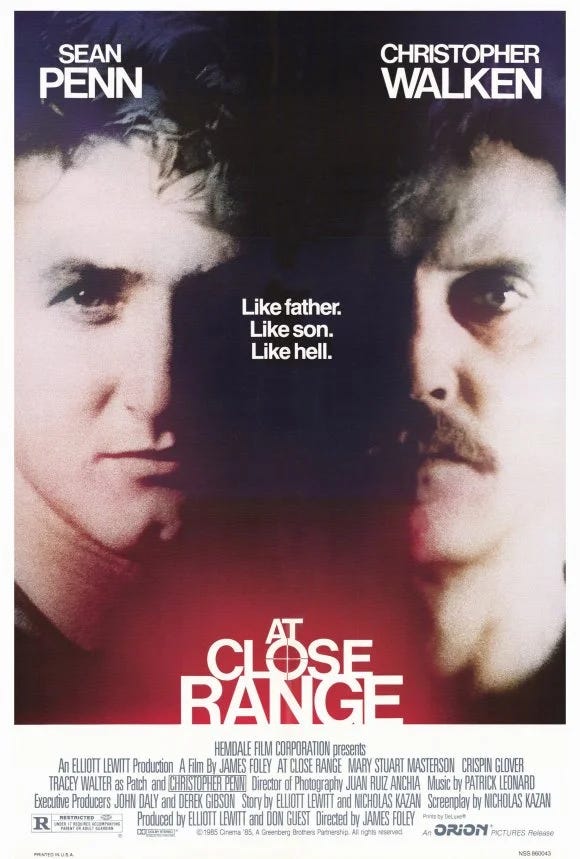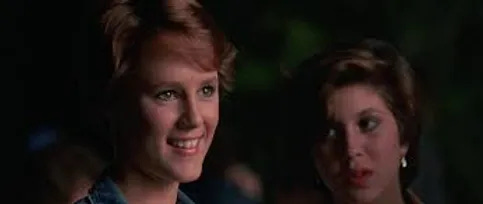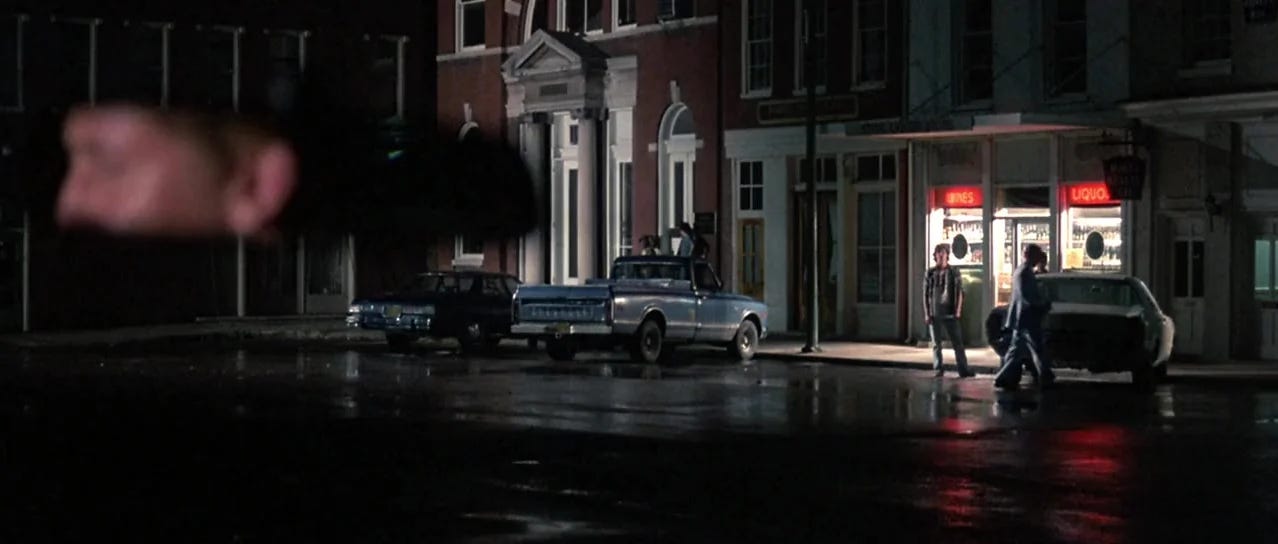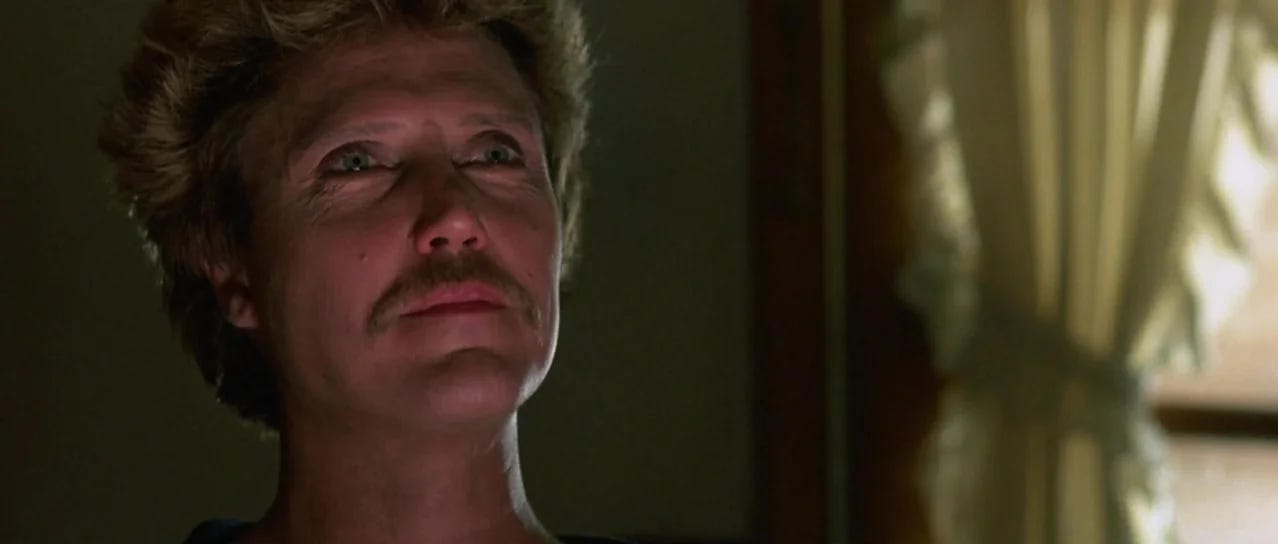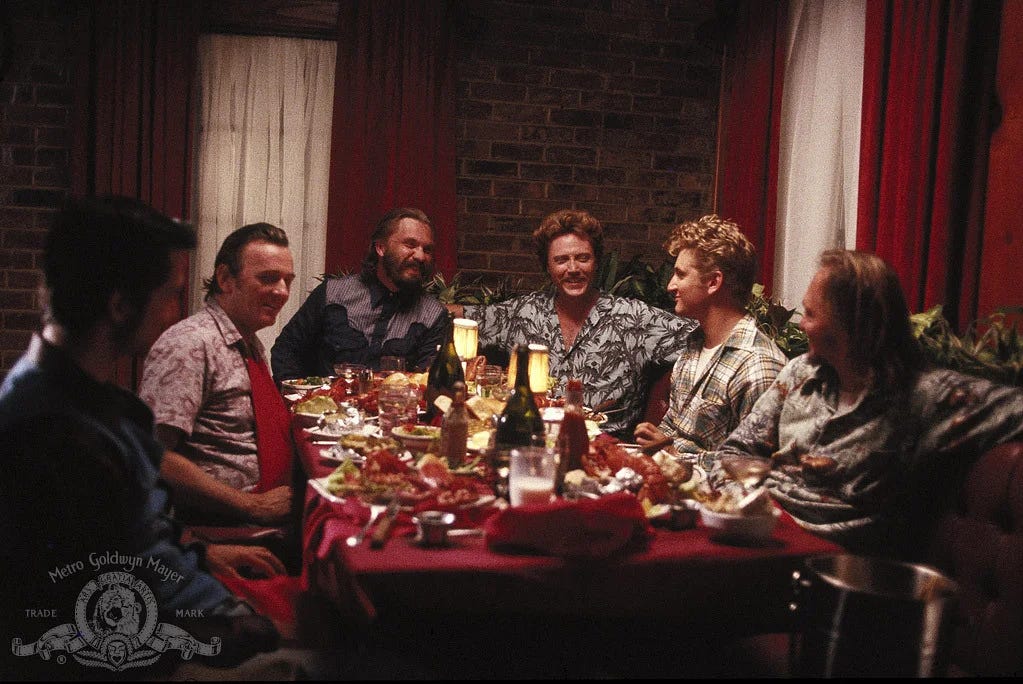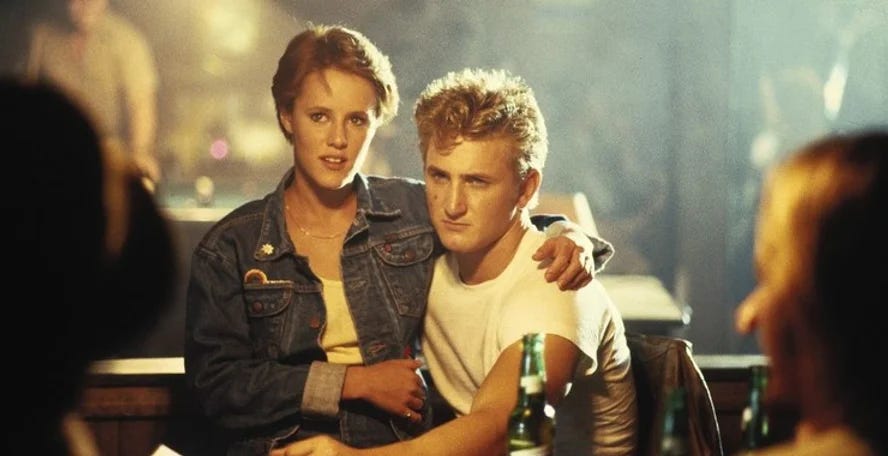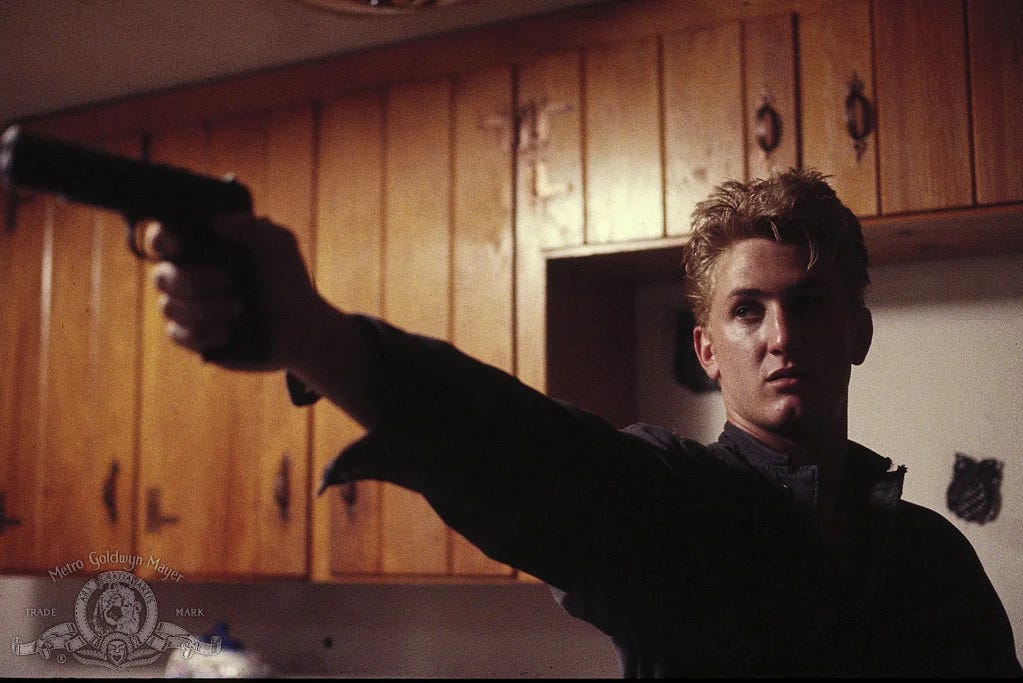Kicking off Noirvember with a Neo-Noir: At Close Range (1986)
James Foley’s At Close Range is a film that doesn’t get talked about much these days, and I’m not sure why. Maybe people aren’t sure how to classify it: redneck noir, family drama, or simply a crime picture. Despite a compelling story with two powerful performances from Sean Penn and Christopher Walken, At Close Range seems on the verge of falling into obscurity. It deserves a better fate.
Driving through a Pennsylvania town at night, a young man named Brad (Sean Penn) sees a girl hanging out with a friend in the town square. He’s mesmerized, and although we don’t know the exact route the film is taking, we know where this is going.
Brad’s reverie is broken as two guys yell at him from across the street: “He took our money!” Brad approaches the boys (one of which is his brother) and the man accused of taking their cash. The boys paid the man five bucks to buy some liquor for them, which he did, but he won’t give them either the money or the booze. “They’re smart-ass kids, so now they’re not getting it,” the man says, challenging Brad, who seems to back off but clearly isn’t scared. As the man gets in his car to leave, Brad calmly climbs onto the hood, refusing to budge as the man attempts to shake him off while driving through town. He’s not successful, but Brad is, eventually getting what he wants, but more importantly, never threatening violence to the man.
This may seem like a typical tough guy scene establishing character early in a film, but it serves another purpose, one we’ll need to remember in just a few moments. The scene is not necessarily for the girl’s benefit but rather to help establish who Brad is: a guy who’ll stick up for his brother and friend, regardless of their stupidity. Yet the moment does act as a catalyst for Brad’s relationship with the girl. She has witnessed the entire event, and as Brad walks up to her afterward, she’s impressed yet a little hesitant. We can’t know for certain, but she’s probably never seen him before. She might sense from his drab green t-shirt and jeans that he’s a kid from “the wrong side of town,” a trope still lingering from films like 1983’s The Outsiders. You could call this a meet-cute, but it really isn’t, not in this type of movie. Brad introduces himself to the girl Terry (Mary Stuart Masterson). He’s awkward and shy and senses hesitation in Terry, but they make a date to meet back in town in a few days.
Like most people walking into theaters to see this movie in 1986, we know from the posters and ads that it’s a father-son story and immediately wonder about the relationship between Brad and his father, Brad Sr. (From this point on, “Brad Sr.” refers to the father, and “Brad” the son.) We don’t know anything about Brad Sr. at this point. Is he a quiet criminal? An enraged killer? Will the apple fall not far from the tree?
We see a striking contrast between the city and the country where Brad lives with his mother (Millie Perkins), father-in-law Ernie (Alan Autry), and his grandmother (Eileen Ryan). It’s a run-down house with the TV constantly blaring. A roach crawls across a kitchen table covered in newspaper and well-worn tools. You can almost smell the place. You can also feel the pervasive boredom and listlessness connected with the house and family.
Later, totally unannounced, Brad Sr. (Christopher Walken) walks in with a steely look that could intimidate, manipulate, inflict sudden violence, or all of the above. Danger is always in the eyes of such characters, no matter how quietly they speak, and Brad Sr. has the look in spades. He stares at his son as if he’s a stranger, and indeed, he is. “How old are you now, anyway?” Brad Sr. asks. Brad replies, “Old enough.”
We learn that it’s been years since Brad Sr. last saw his son, but the main purpose of his visit is to drop off some money for Brad’s mom. “What does she need? $100? $200? $300?” The money and the easy manner in which he dishes it out imply that Brad Sr. is living the good life, which appeals to Brad. And as quickly as he’s arrived, Brad Sr. is gone.
In the next scene, Brad gets into an argument with his father-in-law, Ernie. Perhaps it’s the beers he’s been drinking, or maybe Brad’s tapping into something inherited from his dad, but he stands up to Ernie like he’s been doing it all his life but still gets kicked out of the house. Needing somewhere to stay, he tracks down Brad Sr., hoping to stay with him.
These scenes are where the film really begins as Brad and Brad Sr. get to know each other. We realize Brad hopes that reconnecting with his father will lead to the type of love that’s been missing, but he soon realizes that his father loves only himself. As Brad initially watches and appreciates his dad’s lifestyle, he knows he’s a criminal but isn’t sure just how deep his criminal activities (and his ruthlessness) run.
“I heard you were a thief,” Brad says.
“I never stole nothing,” Brad Sr. replies.
This could be true. Brad Sr. has a whole gang of underlings who are mostly toadies, weak men with a veneer of bravado, unable to see beyond the needs of the next day or perhaps even the next hour. They are Brad Sr.’s true family but are important to him only as henchmen carrying out the real thievery. At Close Range is about family and the lengths people will go to to preserve it or themselves. The history of cinema is loaded with one-dimensional villains, but Brad Sr. is not one of them. As the film progresses, he commits acts that are repugnant and deplorable, but also a part of who he is. It’s a side of his character that hadn’t been previously revealed to Brad, but was that because the father was gone frequently, or because he’s now faced with situations that leave him no other choice?
It may seem Brad and Terry’s relationship has gone from “How you doin’?” to “Let’s get out of here and start our lives somewhere” in a matter of minutes, but Foley has done his audience a favor. We don’t need to see 20 minutes of build-up filled with a developing love story we’ve seen in a multitude of movies. Foley gives us very little that’s unnecessary to the film. We don’t get a lot of backstory on how Brad Sr. got here, we don’t get an entire history of the Whitewood family tree, and we don’t get all that much exposition. We don’t need it. It’s all in the characters and how they’re written (by Nicholas Kazan, son of Elia Kazan) and performed.
Terry upsets the balance of Brad Sr.’s real and criminal families. Unlike the other women in Brad’s life, Terry is not afraid to stand up to Brad’s father when she sees him for what he is. This also puts her in great jeopardy. Brad Sr. doesn’t need a strong-willed woman in his or his son’s life. He needs women he can control, and we see this on the faces of the other women in Brad’s life, women he’s already dominated.
On the cusp of adulthood, Brad isn’t quite sure who he is. He’s not a career criminal like his father, at least not yet, but he still hasn’t found his place. We see enough of Brad Sr. in Brad to make him interesting and unpredictable enough to make us wonder what will happen when father and son have their inevitable showdown. Brad shows an amazing calm under the circumstances (which I won’t reveal here), and Brad Sr. shows that he’s been under pressure before, but not from his son. How much is the son like the father? He’ll find out.
In his review, Roger Ebert wrote that what we see in these characters “are the dynamics (of a criminal society) you could see in the great crime film In Cold Blood (1967), the dynamics where seemingly ordinary people whose moral sense is missing drift into actions so bad that perhaps even they are appalled.”
At Close Range is ultimately the story of a father and son who are literally at close range, observing one another, and wondering how much of each is present in the other. We’re kept guessing the outcome until the end, not knowing to what extent Brad’s DNA comes from his father. The film works so well because of the performances of Penn and Walken, both of whom embody their characters with depth and complexity so often neglected in crime films. If you haven’t seen At Close Range, Noirvember is the time. The film is available from Arrow on November 4, 2024, and is part of my Noirvember New Releases video.


